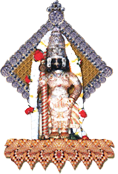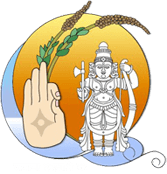Bhagavadgeeta
The Bhagavad Gita is the greatest spiritual and metaphysical scripture of the Hindus. It contains valuable teachings applicable to all stages of human development. Such a universal and all-pervasive teaching with practical solution for every day problems of life fell from the divine lips of the Lord Himself. Sri Krishna had once revealed to his mother the whole universe of infinite dimensions in his tiny mouth; so also, in his short discourse uttered with a limited number of words in a limited span of time Sri Krishna has given the very quintessence of the universal science of life. This indeed is a testimony to the divine glory of Lord Sri Krishna.
Once, after the Kurukshetra war, when the Pandavas were ruling their kingdom, Arjuna besought Sri Krishna: “Oh Lord, I was fortunate to receive from you the teachings of the Gita but that was in the din and bustle of the battlefield; I would very much like to hear it once again at leisure in the calm and peaceful atmosphere now reigning.” To this, the omniscient Lord replied: “Oh Arjuna I do not have the same inspiration today. I cannot recapture that same teaching again.” Although nothing would have been impossible to Him, this episode serves to highlight the extraordinary greatness of the Gita.
The time, the Place and the dramatic context selected by the Lord to give His supreme teaching to humanity are unique. Both the Kaurava and the Pandava armies are lined up face to face and the war is about to begin. The minds of all the soldiers taking part in the war are agitated because they are under the tension of an explosive war. At this time who else but God Himself could have the poise and power to expound such a simple and yet profound philosophic teaching?
In our daily lives, very often grave problems confront us. Confused, we lose our heart. Only at such moments of crisis do we experience the dire need of the Gita. The mind is a battlefield where the good and evil forces fight for supremacy. Unable to face life and its problems, we are prone to run away from our duties and responsibilities out of sheer cowardice. To such cowards, the Gita offers hope and encouragement. It prompts them into rightful action. The Gita which was preached to Arjuna in the context of the Kurukshetra war has wider application to the war that is going on constantly within our mind between the good and the evil forces.
Sri Madhvacharya says that the Mahabharata (which includes the Bhagavadgeeta) has not only a historical but also a metaphysical interpretation. One may wonder whether this teaching given in the bygone days of the Dwapara Yuga will ever be applicable to the modern atomic age! But, in fact, the teachings of the Geeta are perennial and contain elements of truth applicable to all ages.
Main source: The Bhagavad Gita – Translation and Commentaries in English, by Sri S. Subba Rau (1906)
– compiled by Balachandra Achar Hejamady
Bhagavadgeeta Chapters:
Bhagavadgeeta Verse 1.1
धृतराष्ट्र उवाच :- धर्मक्षॆत्रॆ कुरुक्षॆत्रॆ समवॆता युयुत्सवः मामकाः पांडवाश्चैव किमकुर्वत संजय ॥१-१॥ ಧೃತರಾಷ್ಟ್ರ ಉವಾಚ: ಧರ್ಮಕ್ಷೇತ್ರೇ ಕುರುಕ್ಷೇತ್ರೇ ಸಮವೇತಾ ಯುಯುತ್ಸವಃ ಮಾಮಕಾಃ ಪಾಂಡವಾಶ್ಚೈವ ಕಿಮಕುರ್ವತ ಸಂಜಯ ||೧-೧|| dhRutarAShTra uvAcha: dharmakShEtrE kurukShEtrE samavEtA yuyutsavaH mAmakAH
Sri Bhagavadgeeta: verse-by-verse translations
The Bhagavad Gita is the greatest spiritual and metaphysical scripture of the Hindus. It contains valuable teachings applicable to all stages of human development. Such a universal and all-pervasive teaching



